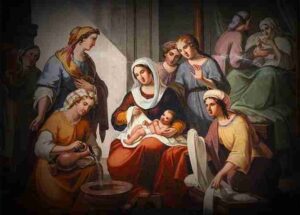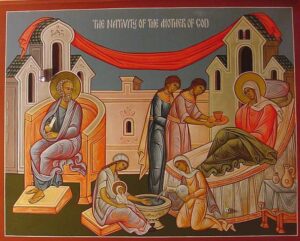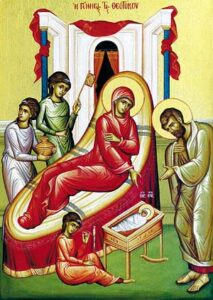The Life of the Blessed Virgin Mary – Nativity (Birth of St. Mary)

The Holy Gospel records but a few incidents from the life of the Blessed Virgin Mary. It says nothing about her parentage, her nativity, or her childhood. All such information comes to us from the early tradition of the Church, which was recorded in the middle of the second century (about 175 A. D.) in the apocryphal book, called – the Protoevangelium of St. James. a work dating from the second century A. D. The apocryphal books are those early Christian writings that tell us about certain events from the lives of Jesus and Mary, which are not included in the Gospels. The so-called Protoevangelium of St. James was held in high esteem and was used as the primary source for their liturgical compositions.
Several prophecies of the Old Testament foretold, the incarnation of the Son of God and the blessed Woman who would become a tool for the salvation of mankind. The very first promise concerning the Redeemer, heard by our fallen ancestors Adam and Eve, contained a prophecy about a special Woman. God said to the devil: “I shall put enmity between thee and the Woman, and between thy seed and Her Seed” (Gen. 3: 15). It should be noted that during the time of the Old Testament the progeny were always called the seed or descendent of a male parent. Only here is the Redeemer-to-Come referred to as the Seed of the Woman, and this was the first indication that He would have no human father. Many centuries afterward the prophet Isaiah added important details to this first prophecy of Genesis. He said that the Woman, who will give birth to the Messiah-Emmanuel, will be a virgin. “God Himself shall give you a sign,” explained the prophet Isaiah to the disbelieving descendants of King David, — “the Virgin shall accept into her womb and bear a Son, and shall name Him Emmanuel, which means: God is with us” (Is. 7:14). Another important message in the prophecy of Isaiah about the coming Messiah is that He will be God Himself. Hence the title Theotokos — “birth-giver of God” — given to the Virgin Mary by the ancient Church.
As we know from early Christian writings, the Apostle Luke the Evangelist personally knew the Virgin Mary and based several chapters of His Gospel on Her recollections. He even quoted Her exact words several times. He was a physician and an artist, and because of his affection for Her, he painted Her portrait, from which later icon painters made copies.

The Birth of the Most Holy Virgin Mary
Mary’s Parents, Joachim (Yuyakaim) and Anna were the parents of the Blessed Virgin Mary. Joachim and Anna, righteous and greatly devoted to God, lived in Nazareth of Galilee and led a very holy life. Mary’s father, Righteous Joachim, was a direct descendant of the royal house of King David, to whom God had promised that from the seed of his descendants, the Savior of the world. Her mother, Righteous Anna, was the daughter of Matthan, and through her father was of the tribe of Aaron and through her mother Mary was of the tribe of Judah. (Matthan, a priest, served just before the rule of King Herod, his wife’s name was also Mary). They had three daughters: Mary, Sovia, and Anna).
Joachim and Anna lived a very modest and simple life and were God-fearing people and were known for their humility and compassion. They had no children, and all their life they grieved about this, especially since they were now in old age. In the Old Testament when God blessed His chosen people, He always promised to bless them with numerous offspring. Thus, among the Jews, childlessness was considered as a sign of God’s rejection, a “public disgrace” (Lk. 1: 25) and shame. But they never murmured and instead the more fervently beseeched God, humbly trusting in His Will and not willing to despair, they continued to ask God to send them a child.
When Anna was very unhappy in her old age for not having a child, Joachim consoled her by saying. “We must continue to hope. God can do everything. While we are alive, the miracle may happen, particularly when we love Him, and we love each other.” They even made a vow that if they had an infant, they would dedicate that child to the service of God. At that time, to be childless meant to be punished by God for sins. Childlessness was especially difficult for Joachim since, according to prophecy, the Messiah-Christ was to be born into his family line.
Once, during the time of a great Feast, the offering, which Joachim took to Jerusalem to offer to God in the Temple, was not received by priest Issachar, who reckoned that a childless man was not worthy to bring a sacrifice to God. This greatly grieved the old man, counting himself as a sinner he decided not to return home, but to flee to a place of solitude in a deserted place among the shepherds and their flocks, to hide his shame. In the wilderness, secluded and fasting, Joachim prayed to God about this. Anna, having heard how the priest had humiliated her husband, began to fast, and in the garden of their house at Jerusalem sadly beseeching God to grant her a child. The prayers of the Holy Spouses were heard. Angel Gabriel appeared to them both, announcing that Anna would bear a child, whose name was to become illustrious throughout the world and the whole human race would call, her Blessed.
The Jews were acquainted with unusual births, in which Almighty God had intervened, by His divine power to show His predilection to some particular people. Such was the birth of Isaac from the childless Sarah (Gen. 21:1-3); of Samson from the barren wife of Manoah (Jud. 13: 24); of Samuel from the childless Hannah (1 Sam. 1:26-28); and of course, the birth of St. John the Baptist from barren Elizabeth (Lk. 1:36-37). So, God blessed also Joachim and Anna in their old age with a providential daughter, who was foreordained, destined to become the Mother of God. Owing to their patience and faith, the Lord finally sent them a great joy: Anna had a daughter. The new-born child was given the name of Mary.
The Birth of Mary: At the command of the Heavenly Messenger, Joachim and Anna returned to Jerusalem where, according to the promise of God, a daughter was born to them, whom they named Mary. The birth of the Most-Holy Theotokos took place thus. Her mother, Anna did not have any labor pain at Mary’s birth, Joachim worried thinking that it was fatal. It was growing dark and the evening was preceded by a furious and very violent storm with torrential rain, wind, lightning, and black clouds. At the time of Mary’s birth, the storm dropped suddenly after one last thunderbolt that was so violent that it threw three men against the side wall, on which a permanent cavity was made. At the same time, a huge rainbow appeared in the sky. Also, a star that shined like a huge diamond appeared in the sky before the sun set. Mary had had the colour, features, smile, the way of moving, glance, and the height of her father. About Mary, Anna says that she is arch of peace, star, pure moon, and pearl.
The birth of Mary has taken away not only the “public disgrace” from her parents, but also became a source of great joy for them, according to the words of the Angel to Joachim: “Joachim, rejoice! God has heard your prayer and your wife Anna shall conceive and give birth to a daughter; whose nativity will become joy for the entire world.” Consequently, the feast is celebrated in the spirit of general rejoicing and exaltation. God, in His divine providence, was preparing Joachim and Anna for “great things” (Lk. 1: 49). He was to show them a unique favor, for the child to be born to them was to become the Mother of the Messiah, the promised Saviour of the world. The nativity of the Blessed Virgin Mary was not accidental, it was well prepared by God from the very beginning of sacred history.

The Nativity of the Mother of God pre-announced the approaching time when the great and comforting promise of God concerning the salvation of the human race from the slavery of the devil was to be accomplished. The Mother of the first-born of all Creation was revealed to all of us as a Merciful Intercessor to whom we confidently run for help in all things. We usually do not celebrate the birthday of the Saints, but rather the anniversary of their death – ‘birthday to heaven,’ considered as the beginning of their blessed life with God. Nevertheless, there are two exceptions, the Blessed Virgin Mary – the Mother of God and St. John the Baptist – the forerunner of our Lord, since we commemorate not only their birthday to heaven, but also their nativity, their coming to this earth. “Mary, who bore Thee, John the Baptist, who baptised Thee…..”. The feast of Mary’s Nativity is above all else an occasion of great joy. The birth of a child is rightly a cause for happiness to the mother and father, particularly when they have begun to despair of ever having children. In Mary’s case, however, the parents’ rejoicing is shared by all creation, for her birth foreshadows the universal salvation that is to come. “Thy birth, O Theotokos, has brought joy to all the inhabited earth. Let there be common joy in the world among angels and mankind“. The birth of Mary may be seen as marking the inauguration of the scheme of salvation: with her birth we already begin to look forward to the birth of her Son, and thus to the redemption that He accomplished in the flesh. “Today grace begins to bear its first fruits”
The Great Feast of the Nativity of the Most-Holy Theotokos, Mother of God, is the highest example of human holiness that the Orthodox Church holds precious and venerates. This day is seen as one of universal joy; for on this day – the boundary of the Old and New Covenants – was born the Most-Blessed Virgin, pre-arranged from the ages by Divine Providence to serve the mystical Incarnation of God the Word. “The day of the Nativity of the Mother of God is a day of universal joy, because through the Mother of God, the entire human race was renewed, and the sorrow of the first mother, Eve, was transformed into joy.” St. John of Damascus.
Hail Mary! Mother of God Pray for us sinners!!

1 Comment
Susan Jacob · September 2, 2021 at 9:21 am
Thank you for the elaborate information of the Nativity of Blessed Virgin Mary. I shared it with my friends.
How can I download the icons you share. I like icons and am saving as many as I can.
Once more appreciating all your posts and the time taken to compile all relevant information. Reafing this is a blessing and prayer in itself. God bless.